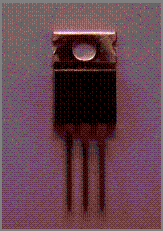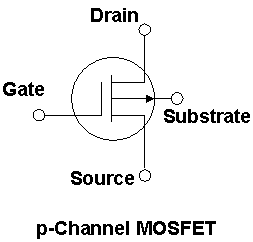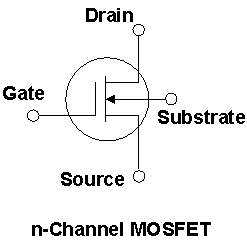How an n-Channel MOSFET works
Field Effect Transistor (FET) is a Semiconductor device with four terminals (Gate, Source, Drain and Substrate), Figure 1. FET is a Unipolar device because Current is produced by one type of Charge Carrier (Electrons or Holes) depending on the type of FET (n-Channel or p-Channel), unlike the Bipolar Junction Transistor (BJT), in which Current is produced by both Electrons and Holes. Metal Oxide Semiconductor FET (MOSFET) is a category of FET. The MOSFET schematic symbols, Figure 2 and Figure 3, have an arrowhead which indicates the polarity of the p-n Junction between the Substrate and the Channel. The following explanation focuses on the n-Channel Enhancement Mode MOSFET.
 Figure 1: Field Effect Transistor
Figure 1: Field Effect Transistor
 Figure 2: Schematic symbol of a p-Channel MOSFET
Figure 2: Schematic symbol of a p-Channel MOSFET
 Figure 3: Schematic symbol of a n-Channel MOSFET
Figure 3: Schematic symbol of a n-Channel MOSFET
MOSFET can operate in three different modes: Cutoff Mode, Triode Mode and Saturation Mode, Figure 4. Table 1 is a summary of the three Operation Modes of an n-Channel Enhancement Mode MOSFET.
 Figure 4: ID–VDS Characteristic Curves of an n-Channel Enhancement Mode MOSFET
Figure 4: ID–VDS Characteristic Curves of an n-Channel Enhancement Mode MOSFET
The MOSFET is very important in electronics. They are used extensively in other Exhibits, especially as Amplifiers in analog circuit and Electronic Switches in digital circuit.
About CMM
Contact US
Others
Other Websites
Number of Visitors:
Last Modified Date: 10/3/2025